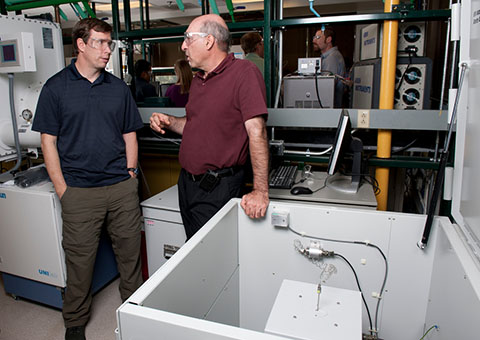Energy Storage Thermal Management
NLR's thermal management research looks to optimize battery performance and extend useful life for various applications, including electric vehicles (EVs).

This EV accelerating rate calorimeter is one example of the numerous advanced thermal characterization tools used by NLR researchers.
Temperature and temperature uniformity both significantly affect the performance, lifespan, and safety of energy storage devices. As a leader in battery thermal analysis and characterization, NLR evaluates battery performance on every level:
- Energy materials through calorimetry and thermal conductivity
- Cells and modules through calorimetry and infrared imaging
- Packs through temperature variation analysis
- Full energy storage systems and the interaction of these systems with other components.
NLR's performance assessments consider the design of the thermal management system, the thermal behavior of the cell, battery lifespan, and safety of the energy storage system as well as full integration of batteries into EVs or stationary storage applications.
Capabilities
Energy Storage Thermal Performance
As a leader in energy storage thermal performance evaluations, NLR's assessments of thermal behavior, capacity, lifespan, and overall performance factor in the impacts of full-system integration.
Isothermal Battery Calorimeters
NLR uses its R&D 100 Award-winning Isothermal Battery Calorimeters—the only instruments in the world capable of such precise thermal measurements—to reduce thermal barriers and achieve more uniform temperatures in batteries. Researchers pair calorimetry results with thermal imaging of batteries to evaluate battery temperature distribution.
Computer-Aided Engineering
In addition, NLR is working with industry to develop multiscale computer-aided engineering software tools to optimize thermal management of batteries and improve battery performance.
Thermal Safety Activities
Battery energy storage systems deliver higher performance at higher temperatures. However, at extreme heat levels the systems can become overloaded and create dangerous conditions. NLR's safety evaluations help to:
- Regulate thermal characteristics
- Provide greater safeguards against thermal runaway
- Increase system performance without sacrificing safety.
Learn about NLR's energy storage safety research.
Contact
Share
Last Updated Dec. 6, 2025
